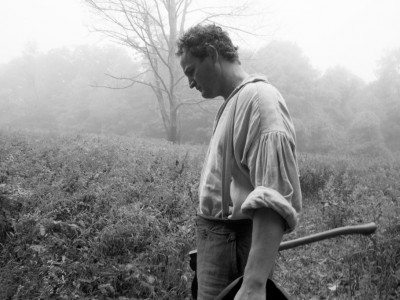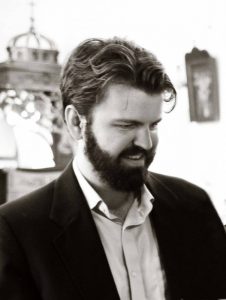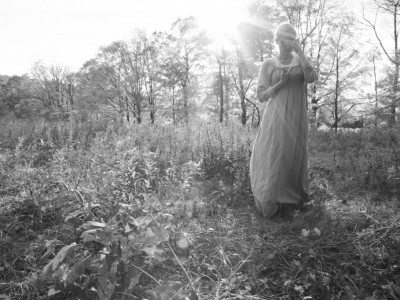

Abraham Lincoln is undoubtedly one of the most important figures in American history, and as such, his life has been the center of countless pieces of popular culture. Somewhere past the Obama allegory of Steven Spielberg’s Lincoln and John Ford’s earnest Young Mr. Lincoln lies The Better Angels, a dreamlike account of Abe’s childhood directed by A.J. Edwards, in what marks his feature length debut. The film has gained notoriety because it was produced by Edwards’ mentor, Terrence Malick, and even seems to borrow his visual style. But past the surface similarities, Edwards’ film proves to be unlike anything else we’ve seen recently.
Assembling an eclectic cast headlined by Jason Clarke as Abe’s father Tom, Brit Marling as his mother Nancy and Diane Kruger as his stepmother Sarah, not to mention the wide eyed Brandon Denney as Abraham, The Better Angels feels more like a profound essay about growing up than a mere biopic or historical film. A unique sensorial experience in more than one way (listen closely how Kruger reads her lines as if gently whispering a lullaby) it’s a film that’s more effective at conveying a sense of long lost youth than it is about telling a story in a conventional way. With its assured hand and sense of purpose, it certainly doesn’t feel like a directorial debut either.
We had the opportunity to talk to Edwards who elaborated on the film’s themes, talked about the importance of education and explained how he intended the film to feel like a certain Stanley Kubrick space epic.
The film begins at the Lincoln Memorial and then goes back in time, so to speak, and we find ourselves in the forests of Indiana. It struck me as very interesting visually, how the similarity of the columns at the Memorial to the tree trunks in the forest, works as an allegory for the cyclical nature of time, and also makes one think that history should at some point repeat itself, and how much we need someone as revolutionary as Lincoln.
You understood everything perfectly and I’m glad that you recognized that editorial transition, I’ve never heard someone bring up the beginning of the film, so it’s nice to hear. The film starts in the Lincoln Memorial because that’s a great secular temple in the United States, it’s almost like a church when you’re there, you go there to venerate. So the film aimed to start with the familiar, in this case the most familiar iconography of Lincoln we have. So we start with this statue and the great heroism it represents, and we transition into a very humble time, a lost time, among these cathedral woods, these towering trees, that are just as massive and majestic as those columns in D.C., and we come upon this poor frontier family and the contrast of this eternal statue and its magnitude, to the humble origins that the statue represents, I thought were very profound.
I’m not sure what the MPAA rating was for your film, but I think it has elements that make it a film that should be seen by children.
That’s another thing I’ve never heard someone bring up and I wanted to talk about it, because it is a family film, but not in its lack of intelligence in the way a lot of family films are. It’s a family film in that it’s universal and far reaching in its message, and it provides inspiration, hope and a very important truth to young and old viewers alike, and I would love for young boys and girls to see it, so that they’d return to their classroom, or church or sports league, or to their own living room with a greater sense of themselves and what they want to be, what their dreams are and how to better themselves. Not that the movie should be didactic, but it should be like a John Ford picture or a William Wyler film, where there’s the possibility that you exit the theater and you feel that you can do something different now, based on the heroic display you’ve just seen.
I couldn’t help but think of this film in terms of Terrence Malick’s constant Christ allegories, and I feel like Lincoln is the one American figure that most often gets compared to Jesus. Was this at all on your mind when you made the film?
It’s important not to deify Lincoln too much, he was a human being, he did have his own shortcomings and even made mistakes, especially in his youth, when you can read accounts about his rebellion, a little bit of his cruelty and mischievousness, but he definitely was a hero. He was messianic to the United States in the way he kept the country bound together and in the end was sacrificed because of it. His loss was our gain, but the comparisons to Christ may end there, because you run into problems when you do that to his story I think.

Going past the Christian allegories and whatnot, there is a sense of people living in communion with the spiritual world in the film. I think you mentioned somewhere of Lincoln being a proto-Baptist of sorts, and I couldn’t help but wonder if we’re meant to believe that young Abe was getting messages from nature in a way.
Certainly. I think that the movie moves a bit at the rhythm of the natural surroundings, in other words it takes its time in certain places and those towering trees were his world for some time, and if anyone has ever been in a forest like this, which they should have been lucky to be in because they’re so precious, it is quite an experience and it can transform you because of how humbling it is. Lincoln lived at a time when it was endless trees, the description of Indiana at this time, by one of his neighbors was “trees, trees, trees and more trees”. So the meadows and prairies that you see in the film are poetic license, because there wasn’t that much of those in Indiana, but it would be claustrophobic to remain in the woods forever in the picture, but certainly those woods would have made long lasting impressions on him.
A lot of recent films have made us feel like we should be afraid of nature, if you’re in the forest, you’ll be killed by a wolf or a witch. Your film however presents us with a sense of harmony and peace. How do you achieve this when audiences have been conditioned to be afraid?
A cabin in the woods! As far as why one is terrified, I’m not able to explain about that. But the successful depiction of showing our relation to nature in the picture is the result of those young Kentucky boys and girls, and how natural and joyous they are in those surroundings on our set. They were athletic, outgoing, comfortable outdoors, they knew its idiosyncrasies, and it was beautiful to capture them slipping and sliding on mossy rocks, running in fields, swimming in the river. That documentary approach and their natural tendency to have fun in that environment was lovely.
If I’m not mistaken when you first worked with Malick in The New World, he had started gathering notes of his own for a Lincoln project, right?
He had a few notes about an idea of his and I had brought to him an idea of my own not knowing that he had one. What I had imagined was more scopic than his in my naivety of youth. Mine was not practical, it spanned more years and he wisely suggested to narrow the aim and that was his involvement from the start. It was two ideas that became one and he gave a great target saying that it was this transitional time in between mothers that was the slice to go for.
As a young filmmaker how did you even become interested in making a historical film? History isn’t something many filmmakers want to deal with, especially not as their first film.
It’s impractical to start that way because they require a little bit more money, a few more people. This was an affordable independent film, but shooting in New York City on video in an apartment would have been more appropriate for a first time filmmaker, but the approach of this film was so sound that it made it practical. There were a limited number of characters and locations, we shot it quickly on a tight schedule and that’s what made it doable, the idea was to make it like a play, to keep it manageable.
Whenever we think about the “fathers of the nation” we think of men, so I found the emphasis on matriarchy very interesting. How did you come to develop that?
Mothers are essential, I was recently very moved by that MVP speech by Kevin Durant where he called his mother the MVP when he received the award, and talked about how much she went without in order so that he could have food, money, lodging...the nights that she stayed up helping him with his homework. It was very powerful testimony, and that’s kind of a microcosm of the Lincoln story and a modern day one. I think Lincoln had his father’s strength, work ethic and the religious fiber, but he also had his mother’s compassion, tolerance, long suffering, gentleness, her poetic inclination. The film puts on this thesis that his stepmother rescued him, he was in loss and despair, but it was through her love that he seeked self-education and she created a lifelong bond with him. She was essential to the building of his character and to shaping him.

To be honest, I had doubts when I first saw that you’d cast Brit Marling and Diane Kruger to play the mothers, because I have always thought of them both as these very icy, Hitchcock blondes, so I couldn’t believe the warmth they ended up bringing to their parts. Can you talk about casting those two parts specifically?
What you might call Diane’s iciness I would almost say is her nobility, how regal she is. There is a very deep beauty in her that moves many, she’s very intelligent, very funny, her understanding of the role was incredible. And Brit is very warm, the boys and girls took to her almost immediately, she did a very good job forming this bond with her, so that when she dies in the film, her absence was truly felt on set and with the cast. It was a very clever thing of her to do. They are what I’m most proud of in the film, they’re in the title, and they’re the essence of the film. I feel so blessed that they committed to the film and took it to a new level.
Now that you mention Brit’s bond, was the film shot chronologically?
As much as we could, but it depended on schedule and location availability.
I guess it also had to do with the children, right?
Exactly. Because they’re non-actors chronology does help them. I remember reading that about E.T. and how important that was. You can imagine how being a ten year old and dealing with this whole new way of life for you, the chronology would really help emotionally.
You’ve mentioned the film’s tight schedule and small budget, yet watching the film you get a sense of luxury, as if you let your actors wander in forests and just waited for them to do something you wanted to capture on camera.
Shooting quickly and editing with time seems like a good strategy. Of course doing both at your own pace would be ideal, but keeping a cast, crew and location and all the moving parts that come with that is very difficult financially, so we did shoot quickly and if the film has the feeling that we didn’t, our goal was definitely to make it an experience picture. Not to have the darkness of say Béla Tarr or Alexander Sokurov, but to have that rhythm where you enter into each and every shot. You can walk into it and look around, make use of the deep focus, choosing what you wish to experience. To enter the time was very important, and hopefully you feel the shift upon entering the theater that people must have felt back in 1968 with 2001: A Space Odyssey and all of a sudden you have this ape sequence that just stopped time and puts you into a completely different epoch.
The camera made me think of two things: first you are granting the audience the opportunity to share in this “dream” of Lincoln, and at the same time you’re allowing us to be more sci-fi-esque and you allow us to travel back to a time that movies have only represented through the Technicolor extravaganza of something like Gone with the Wind or the realism of something like 12 Years a Slave.
The dreamlike quality also parallels to being in the perspective of a child where your thoughts are more meandering, they’re freer. You see the visible as well as think the invisible, and to have that quality in the film was important. The camera is always low like the point of view of a child, there’s a film by Kevin Brownlow called Winstanley about Cromwellian times and it’s sort of like Welles’ Chimes at Midnight in how immediate and realistic the times feel. Sometimes anachronisms in period films can throw you off, Barry Lyndon sometimes still feels like the 1970s to me when I watch it or 12 Years a Slave feels like it was made today. I really love pictures that transport you and feel like they’re part of a different world, especially because this era, early 19th century America, hasn’t really been chronicled in cinema. The same for the Revolution, what we usually see is the Civil War and the Reconstruction, and Westerns usually linger between 1840 to 1860 or 1880 to 1890, so there’s something about the 1820s that you don’t get to see often. Things like the Battle of New Orleans for example.
I don’t mean to get too political, but you highlight the importance of education in the film, at a time when the American system is being criticized for being too expensive and not really preparing children for their future, what do you think is the importance of self-education?
Lincoln was an autodidact, a miracle child in his understanding of literature, poetry, history, politics, law and it’s incredible that he only spent one year of his life in a classroom. Such was his discipline and work ethic, and in the three campaign autobiographies he wrote I don’t think he mentions his wife or his children, but he mentions his three teachers and that says a lot about how he felt for those men and the gift that they were to him. So what we might just think of as a fourth grade teacher or a pastor at Sunday school, or a community leader... all of these people really have an incredible impact that can be for good or not, and just as the mothers were Lincoln’s better angels, so were his teachers. He was a reflection of their intelligence and so can be said for all of us, we are reflections of the good or bad around us, some of it is already within us, but the rest is poured on us and I think that’s an idea from the film we could simplify as that old cliché of “it takes a village…”
The Better Angels is now in select theaters.